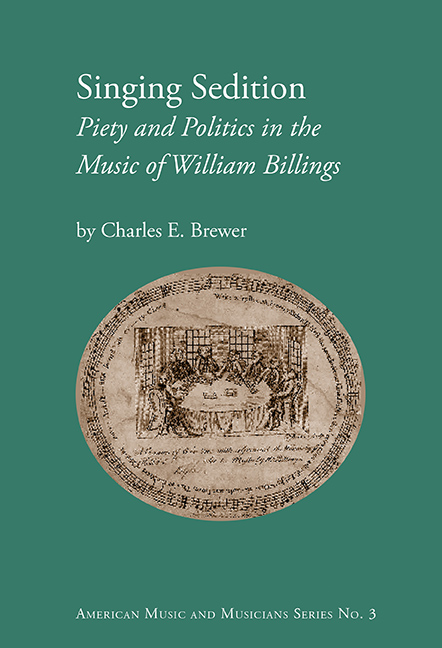Book contents
- Frontmatter
- Table of Contents
- List of Illustrations, Musical Examples, and Tables
- Prologue
- Acknowledgements
- Abbreviations
- Part I Rebellious Voices in Billings's Boston
- Chapter One Samuel Adams, Singing Societies, and Boston Orations
- Chapter Two The Clerical “Black Regiment”
- Part II Singing the Rebellion
- Epilogue
- Appendices
- Bibliography
- Index
Chapter Two - The Clerical “Black Regiment”
from Part I - Rebellious Voices in Billings's Boston
- Frontmatter
- Table of Contents
- List of Illustrations, Musical Examples, and Tables
- Prologue
- Acknowledgements
- Abbreviations
- Part I Rebellious Voices in Billings's Boston
- Chapter One Samuel Adams, Singing Societies, and Boston Orations
- Chapter Two The Clerical “Black Regiment”
- Part II Singing the Rebellion
- Epilogue
- Appendices
- Bibliography
- Index
Summary
Historians have discussed many aspects of the role of religion in the formation of revolutionary sentiments among Americans. In the English colonies, it appears that the “Great Awakening” from the 1720s to the 1740s helped prepare this symbiosis between religious and political views, creating in essence a political theology. This was clearly noted by Ruth Bloch.
The Great Awakening powerfully reaffirmed the radical and democratic elements of Reformation Protestantism in its insistence on the fundamental equality and solidarity of the faithful and the higher virtues of the simple, ascetic life.
Having been born in 1746, William Billings was too young to have directly experienced the “Great Awakening.” Any early education (perhaps at the South Writing School) stopped at around age 14. He was then trained as a tanner to help support his family, probably following the death of his father, William Billings Sr. in 1760, who had all but disinherited his widow, brothers, and son. Though his formal schooling may have ended, every week the younger William Billings would have been influenced by the continuing resonances of the “Great Awakening” through the preaching of the pastors at Boston's New South Church, where his mother was named in 1740 among those holding the “Baptismal Covenants and not to Full Communion.” The senior pastor during Billings's youth was, Rev. Samuel Checkley (1696-1769), who had invited the evangelical English pastor, Rev. George Whitefield, to preach at New South in 1740 and 1745. As a teenager, Billings would have experienced not only the spiritual and literary influence of the preaching and music in the regular services and lectures but also the deep connections in Massachusetts between religion and civil government, expressed not only from the pulpits but also in “civic” sermons, such as those found in the yearly election sermons and the artilleryelection sermons for the local militia.
A POLITICAL THEOLOGY
Rev. Jonathan Edwards in his treatise of 1742, Some Thoughts Concerning the Present Revival of Religion in New England, used strong biblical images, derived from Psalm 110:5-6, to look forward to a “new order of the world” if the political leaders would not follow Christ.
- Type
- Chapter
- Information
- Singing SeditionPiety and Politics in the Music of William Billings, pp. 29 - 58Publisher: Boydell & BrewerPrint publication year: 2017



